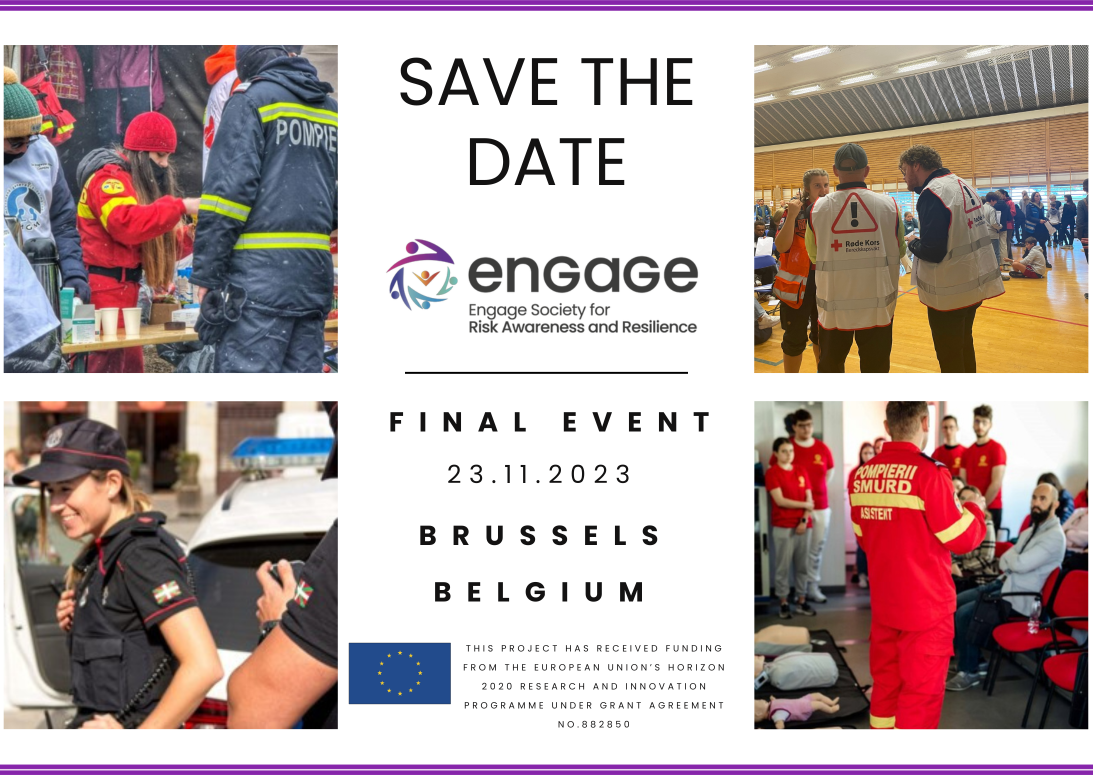Enhancing citizen involvement in disaster preparedness, response and recovery: A step forward for the Health Emergency Preparedness and Response Authority (HERA)?
The actual global scenario is increasingly exposing human society to more hazards. It is becoming imperative that individuals, and specifically the civil society at large, acquire the ability to rapidly respond to natural disasters and man-made risks.
The importance of risk awareness and disaster preparedness
Risk awareness is indeed a strong priority for modern societies, and social resilience is necessary to enhance successful responses to unexpected emergencies.
In the actual strategies, there is a gap between the formal effort of public authorities to protect citizens from harm and the voluntary support provided by citizens during emergencies.
Starting from this awareness, the EU-funded ENGAGE project addressed the whole society and tried to bridge the different ways of intervention to make communities more skilled in responding to disasters jointly and, therefore, more resilient.

The ENGAGE final event: Enhancing the resilience of societies to nature-derived and man-made disasters
Next November 23rd, 2023, in Brussels at Transforma Evere (Av. Jules Bordet 13, 1140 Evere), the ENGAGE final event will be dedicated to the cross-disciplinary sharing of perspectives, best practices, and innovative directions to enhancing the resilience of societies to nature-derived and man-made disasters. Click here to know more about the programme, for registration, click here.
For the occasion, has been invited first responders, public authorities, individuals from the research community, and policy makers to an insightful, one-day event which will feature discussion panels, presentations, and interactive workshops.
Tools, technologies and strategies
In fact, the overall theme of this event is to highlight tools, technologies, and strategies that can be employed to enhance the involvement of citizens in the processes of preparing for, responding to, and recovering from nature-derived and man-made disasters.
Over the course of a full day of panels, discussions, and workshops, ENGAGE will focus on:
- Sharing different perspectives of organizations involved in the management and response of disastersregarding facilitating interactions with citizens.
- Exploring citizen-driven initiativesestablished in response to a crisis and their implications for professional disaster management strategies and planning.
- Reflecting on the research process of ENGAGE, and discussing lessons learned that can be considered for ongoing and future projects.
- Highlighting the importance of taking an interdisciplinary approach to enhancing the ability of societies to respond and adapt to disasters.
An important part of the EU-level coordination on preparedness and response towards cross-border threats to health has been allocated to a new European Commission service, the Health Emergency Preparedness and Response Authority (HERA), established almost two years ago.
The paradox is that HERA’ functions do not cover also the citizen involvement in disaster preparedness, response and recovery. Now is the moment to take stock of the role of HERA, its achievements and limitations, and how it can continue strengthening the EU’s capacity to address health threats.
Involvement of civil society organisations is essential
To date, the HERA Civil Society Forum (CSF) has served as a bridge of information and exchange between the Commission Services and European-level civil society in the health field. The involvement of civil society organisations is essential, as they represent key interest groups, including healthcare professionals and citizens, who play a fundamental role in both the preparedness and response phases.
The Civil Society Forum brings together a broad variety of these organisations and is instrumental in scoping health threats and guiding optimal operational responses to health threats.
As part of the broader mid-term review of HERA, for Active Citizenship Network, the EU branch of the Italian NGO Cittadinanzattiva, member of the EU-funded ENGAGE consortium project, and official member of The HERA Civil Society Forum (CSF), the final event of ENGAGE project represents – indirectly – a great occasion also to reflect about how HERA’s competencies, tasks, resources and overall mandate could be further defined, enlarged and specified.
(Mariano Votta, Responsible EU Affairs at Cittadinanzattiva & Director of Active Citizenship Network).




![Europe’s housing crisis: A fundamental social right under pressure Run-down appartment building in southeast Europe set before a moody evening sky. High dynamic range photo. Please see my related collections... [url=search/lightbox/7431206][img]http://i161.photobucket.com/albums/t218/dave9296/Lightbox_Vetta.jpg[/img][/url]](https://www.openaccessgovernment.org/wp-content/uploads/2025/04/iStock-108309610-218x150.jpg)






